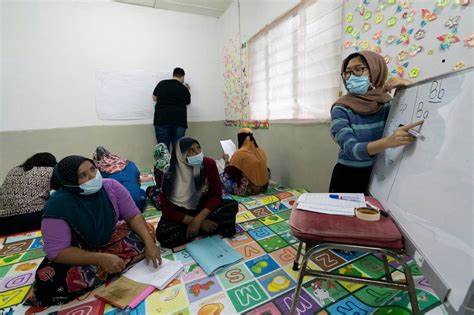(单词翻译:单击)
听力文本
Malaysia Group Teaches Refugee Women to Read and Write
It could be a picture from any English language classroom. A piece of paper with English letters hangs on the wall. A teacher stands and points to the letters. The students sit on the floor and repeat them out loud.
The difference in this Malaysian classroom is that the students are not children. They are adult, refugee women, some in their late 50s. They are learning how to read and write, both in Malay and English, for the first time.
A group called Women for Refugees offers the weekly classes in a neighborhood outside Kuala Lumpur. Two law students formed the group in September to help migrant women learn to read and to help them find a place in the local community. Another goal of the group is to help the women create a fuller life for themselves, one that includes work.
Twenty-three-year-old Arissa Jemaima Ikram Ismail told the Associated Press that a refugee leader in the town of Selayang asked her to help women in his community. Selayang is home to many migrant workers.
She and fellow law student Davina Devarajan, who is 25, then met some of the women. They were surprised that the women wanted to learn both English and Malay languages. For most refugee women, Arissa said, education is often considered unimportant.
"It was very essential for us to not pitch the refugee women as a charity, where they are constantly requiring external aid. So we want to equip them with the necessary skills so that they can sustain themselves, so that they aren't dependent on anything else."
Zaleha Abdul is a 54-year-old Muslim Rohingya refugee. She said that before joining the group she did not know any English. Zaleha has struggled to remember the English alphabet but will not give up. She said she wants to be more independent.
Arissa and Davina formed Women for Refugees and found teachers on Instagram. They now have about 20 volunteers. They give weekly, two-hour reading and writing classes in English and Malay. They teach in a worn two-story building that houses about 50 families.
The free classes are open to all migrant women. However, currently the students are all from Myanmar and Indonesia.

For the first classes, more than 12 women, from ages 18 to 50, attended classes and they brought their children. The children, like all children anywhere, made it difficult for the mothers to learn. So, the group launched classes for the children in a separate room. This way, their mothers could continue their studies.
Davina said the group hopes to expand classes in other neighborhoods. They also want to include technical skills that could help the women earn an income.
However, since mid-October all classes have stopped. Restrictions were put in place in Kuala Lumpur and surrounding areas to stop an increase in coronavirus cases. Recently the restrictions were expanded to most of the country, and all schools nationwide will be shut until the end of the year.
Shahidah, a Muslim from Myanmar and a mother of two, said she was preparing for a new life in another country. She was called for interviews three times last year by the United Nations High Commission of Refugees (UNHCR) on possible resettlement to a third country. But there has been no news during the coronavirus pandemic.
"English is important for us," she said. "When we go overseas we will need English."
Arissa said teaching still goes on with pre-recorded lessons that are watched on three shared laptops where the migrants live.
Also, live classes are being conducted once a week for older migrant children.
About 178,000 refugees and asylum seekers in Malaysia are registered with the UNHCR.
And that's the Education Report. I'm Anna Matteo.
重点解析
重点讲解:
1. a piece of 一张;一片;
He handed her a piece of paper certifying she was in good health
他递给她一份她的健康证明书。
2. dependent on 依赖于;依靠于;
You can't be dependent on your parents all your life.
你不可能一辈子靠父母生活。
3. be open to 对……开放;向……开放 ;
The show will be open to the public at 2pm; admission will be 50p.
演出下午两点开始,入场费50便士。
4. expand to 扩大为;扩展到;
The plan is to expand to 300,000.
他们的计划是扩充到30万人。
参考译文
马来西亚组织女性难民读写
这可能是任何英语教室的景象,墙上挂着写着英文字母的纸,一位老师站着,指着那些字母,学生们坐在地板上大声重复。
这个马来西亚教室的不同之处在于学生不是孩子,她们是成年的女性难民,有些已经50多岁了,她们第一次学习如何用马来语和英语读写。
一个名为“难民女性”的组织在吉隆坡郊外的一个社区每周提供课程。九月份,两名法律系学生组成了这个小组,帮助女性移民学习阅读,并帮助她们在当地社区找到住所。该组织的另一个目标是帮助女性为自己创造更充实的生活,其中包括工作。
23岁的阿里萨·杰迈玛·伊克拉姆·伊斯梅尔告诉美联社记者,塞拉扬镇的一名难民领袖请求她帮助他所在社区的女性,塞拉阳是许多外来务工者居住的地方。
她和另一个25岁的法律系学生戴维娜·德瓦拉坚见了其中一些女性。令她们吃惊的是,这些女性想学习英语和马来语。阿里萨说,对大多数女性难民来说,教育往往被认为是不重要的。
“对我们来说,非常重要的是不要把女性难民组织说成是慈善团体,她们经常需要外部援助。所以,我们希望为她们提供必要的技能,使她们能够自食其力,从而不再依赖别人。”
扎莱哈·阿卜杜勒是一名54岁的罗兴亚族穆斯林难民。她说,参加这个小组之前她不会任何英语。扎莱哈一直在记住英语字母表方面很吃力,但她不会放弃,她说想要更加独立。
阿里莎和达维娜成立了“难民女性”组织,并在Instagram上找到了老师。她们现在有大约20名志愿者,每周提供两小时的英语和马来语的读写课程。她们在一栋两层楼高的破旧教学楼里教书,那里住着大约50户家庭。
所有的女性移民都可以免费上课。然而,目前这些学生都来自缅甸和印度尼西亚。
在第一节课上,超过12名年龄在18岁到50岁之间的女性参加了课程,她们还带着孩子。这些孩子和其他小孩儿一样,让母亲们很难学习。所以,小组在一个单独的房间里为孩子们开设了课程。这样,他们的母亲就可以继续学习了。
戴维娜说,该组织希望扩展其他社区的课程。她们还希望纳入能够帮助女性赚取收入的专业性技能。
然而,自10月中旬以来,所有课程都停止了。吉隆坡及其周边地区实施了限制措施,以阻止新冠病毒病例的增加。最近,这项限制措施扩大到全国大部分地区,国内所有学校都将关闭到今年年底。
来自缅甸的穆斯林沙希达有两个孩子,她说她正准备到另一个国家开始新的生活。去年,联合国难民事务高级专员公署(UNHCR)曾三次就可能把她重新安置到第三国的问题与她进行面谈。但是,在新冠病毒大流行期间没有任何消息。
“英语对我们很重要,”她说,“当我们出国时,我们需要英语。”
阿里萨表示,教学仍在继续,可以在移民住处的三台共享笔记本电脑上观看预先录制好的课程。
此外,对于年龄较大的移民儿童,每周还会举办一次现场培训班。
马来西亚约有178000名难民和寻求庇护的移民在难民署登记。
您收听的是《教育报道》节目,我是安娜·马特奥。
译文为可可英语翻译,未经授权请勿转载!


